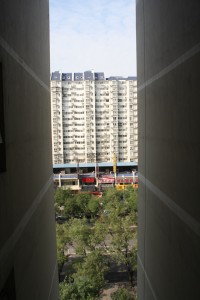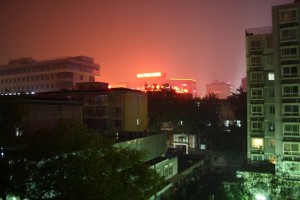Apartment Hunting in Beijing, China
 Having decided to stay in Beijing for a while, we set bout organizing ourselves to look for an apartment. We were determined to stay in the central area of Beijing, right in the middle of the expat community. Sanlitun is a great area, near the shopping, bars, restaurants and other expats. It is a great area to live about 10 minutes from, which is where we started looking. We wanted a traditional, small-town Chinese community with a courtyard and trees. We also wanted to be near the subway and have access to fresh air and sunlight (meaning, high up in an apartment). With such in mind, we got online and started looking for apartments. It turned out that apartment hunting in Beijing was a different beast than the relatively easy process in Shanghai.
Having decided to stay in Beijing for a while, we set bout organizing ourselves to look for an apartment. We were determined to stay in the central area of Beijing, right in the middle of the expat community. Sanlitun is a great area, near the shopping, bars, restaurants and other expats. It is a great area to live about 10 minutes from, which is where we started looking. We wanted a traditional, small-town Chinese community with a courtyard and trees. We also wanted to be near the subway and have access to fresh air and sunlight (meaning, high up in an apartment). With such in mind, we got online and started looking for apartments. It turned out that apartment hunting in Beijing was a different beast than the relatively easy process in Shanghai.
First, we combed the online site listings, which revealed a more expensive bracket of apartments than we really needed. We discovered that Andrew, the Oklahoma boy from the Mongol Rally, was also staying in Beijing for a while, so we joined forces to find an apartment for three, and then, when another friend at the hostel joined the group, we started looking for four-person apartments. This dramatically decreased our options since the one-child policy means most apartments have only two bedrooms and, if lucky, an office room.
 Nevertheless, we decided to meet with a man renting his apartment online. We showed up only to discover it was actually a crooked realtor who was planning on charging one months rent in commission to show the apartment for his ‘friend.’ We waited until the realtor left and told the actual owner we’d take the apartment, he declined unless we paid a fee to the realtor, which we declined to do. After several more days of looking we found a two bedroom with an office in our price range. A different, semi-crooked realtor only wanted half a months rent for commission. Thing got convoluted quickly when the actual owner failed to materialize and in her place came a small army of men and women in suits claiming to represent her. Despite the annoyance of dealing with two different sets of middle men, we decided to get the apartment. It was in a great location with a decent interior and furniture, and room for 4 people, albeit barely. This picture is from our balcony, and shows a bit of the infamous Beijing pollution.
Nevertheless, we decided to meet with a man renting his apartment online. We showed up only to discover it was actually a crooked realtor who was planning on charging one months rent in commission to show the apartment for his ‘friend.’ We waited until the realtor left and told the actual owner we’d take the apartment, he declined unless we paid a fee to the realtor, which we declined to do. After several more days of looking we found a two bedroom with an office in our price range. A different, semi-crooked realtor only wanted half a months rent for commission. Thing got convoluted quickly when the actual owner failed to materialize and in her place came a small army of men and women in suits claiming to represent her. Despite the annoyance of dealing with two different sets of middle men, we decided to get the apartment. It was in a great location with a decent interior and furniture, and room for 4 people, albeit barely. This picture is from our balcony, and shows a bit of the infamous Beijing pollution.
Note: If you are looking for an apartment in Beijing, your best bet is to check the Beijinger and CityWeekend online and in print, and beware that most postings are by crooked realtors looking to take a higher commission rate off foreigners. You can also go through a local real estate company. First, you find the area you want to live in and then walk around and look for a real estate office. There is one on every major road or in most residential areas. Often, there will be an office just for a specific building or complex, and you can cut out come commission costs by going directly to the one you want.
Next time: Job Hunting in Beijing, China!

